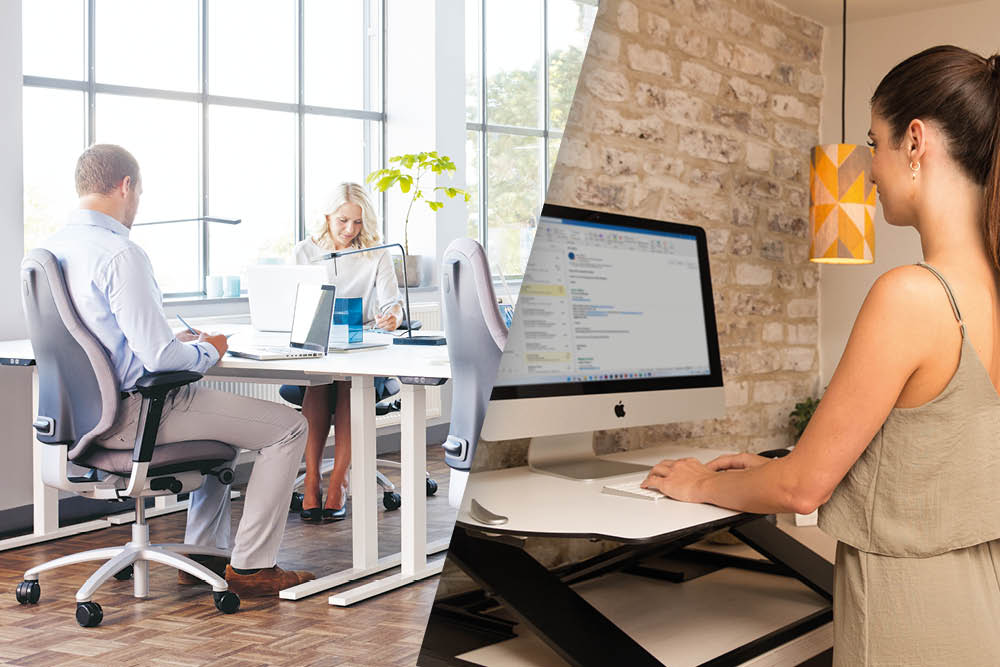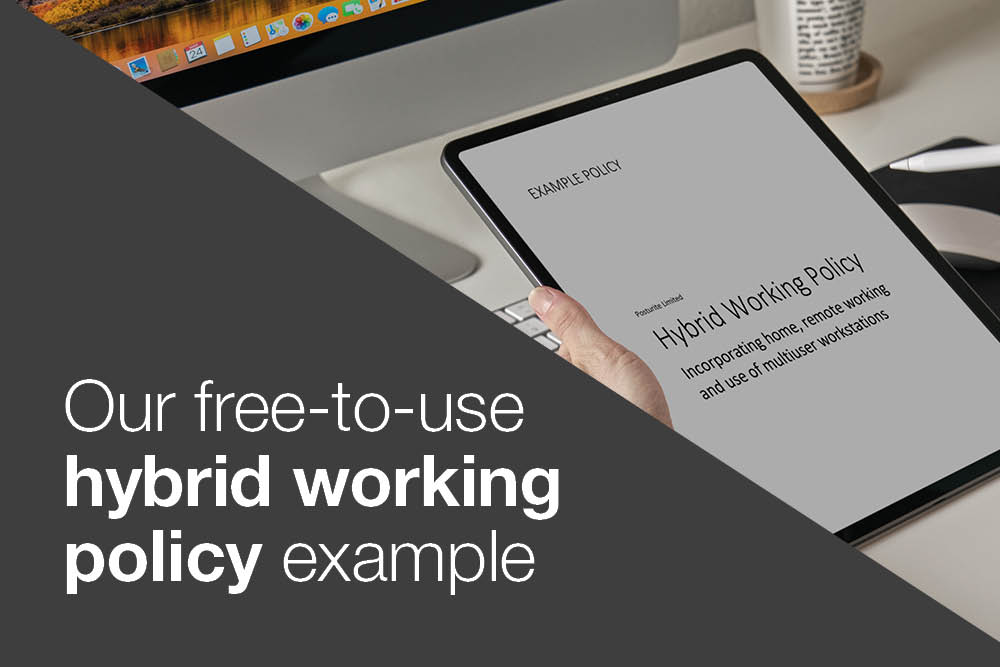
Sir Alan Sugar is furious. This experienced business leader and Chairman of the Amshold Group commented on 5 May 2022 that "All this working from home is a total joke. There is no way people work as hard as when they had to turn up at a work location." (A little of the fury has been edited out there.)
Working from home is one aspect of the hybrid working model which is widespread in British business culture right now. In this article I'll look at the extent to which hybrid working is the new normal, and if the revolutionary effects of Covid-19 on working trends will be permanent.
You're a hybrid worker if you spend part of your time working remotely and part of your time working at the office or on the go. Remember that song 'Manic Monday' by The Bangles? They had to 'Catch an early train - Got to be to work by nine' but that was 1986 and in 2022 - if you don't have children and you're not an Air Traffic Controller - your Monday may start with a sip of coffee on your apartment balcony and a gentle dog-walk around the local park. Your manic dash for the 7.02 to Waterloo might be Tuesdays to Thursdays only now.
Latest hybrid working statistics
The Chartered Institute of Management (CMI) polled 1,237 managers (41% from the private sector and 59% from the public and non-profit sectors) in early 2022 - and the results are significant; 80% said their firms had adopted hybrid working, reports the BBC.
CMI chief executive Ann Francke says "We are experiencing an uptick in productivity, and an uptick in many companies' results. We're not saying everyone should work from home 100% of the time, we're saying the best practice is to have a blend, so when you come into the office you can do those things that are very difficult to do remotely."
A Q3 2021 Opinions and Lifestyle survey by the Office for National Statistics revealed that 87% of UK working adults planned to be hybrid working, as soon as their usual place of work could be open.
This was made up of:
- 42% saying 'I will mostly work from home and sometimes from my usual place of work'
- 24% saying 'I will split my time evenly between my usual place of work and home'
- 21% saying 'I will mostly work from my usual place of work and sometimes from home'
This was among those whose usual place of work before the pandemic was not at home.
A YouGov survey of 2,046 UK workers found that 51% of respondents who had the choice to mix remote and office working in Q4 of 2021 would consider leaving their company if this flexibility was removed. That's actually lower than I would expect – and this international Future Forum survey put it at 72%.

The Microsoft 2022 Work Trend Index is a useful resource for us as it outlines findings from a study of 31,000 people across 31 markets during Q1 of 2022. Only 50% of leaders said that their company requires any full-time in-person work in the year ahead.
Finally, 25% of UK jobs advertised in December 2021 mentioned hybrid or flexible working. That's up from 19% before the pandemic. These figures are from analysis from the Recruitment and Employment Confederation and Emsi Burning Glass, reported by Sky News. The job site Indeed reports that in the UK, remote-job postings have increased 329% since 2019, but demand from jobseekers is enormous - the number of searches for remote working jobs has skyrocketed 790% since 2019.
Opinions on hybrid working
Employers should beware of weakening loyalty due to hybrid working, suggests Emma Jacobs in the FT.
And "If you want a career, go to the office – if you want a job, stay at home" says Jo Owen, founder of Teach First and seven further NGOs, to the CMI.
However there is great enthusiasm from many quarters for the continuation of hybrid working. Louise Goss, founder of www.thehomeworker.com says that: "The majority of individuals and employers that I speak with are in favour of hybrid working. While there is still reluctance from some organisations, people are recognising that offering hybrid working is necessary to attract talent by giving people a choice. There will be issues to overcome such as ensuring people are getting a mix of interactions and new recruits get the onboarding and training they need. However a hybrid model allows the best of both: in-person and virtual work, which can be a more flexible and convenient option."
Louise also makes an important point about our human need for meeting with others:
"Among The Homeworker community, the main challenge now is a lack of social connection. Hybrid working is almost certainly a long term work model but the workplace will start to become an important place for social interaction above focused work."
Editor Lucy Huber on Twitter agrees: "I think I'm the only person who loved working in an office. Especially an open office!" she says. "You could wander over and chat with anyone at any time! Make people go to happy hour with you, have little snacks together..."
We need to spot signs of work from home fatigue and seek out tips to be as productive as we can.

Sky News interviewed Founder and CEO of Mumsnet, Justine Roberts and I love her take on the topic: "Hybrid working is something that women, in particular mothers, have been desperate for, for years. The pandemic has allowed us to test this, and the world hasn't fallen in."
She points out however that "There is a risk that as we move to more established patterns that the women end up being the remote workers and the men go back to the office – and because they're in the office they have more influence." People are calling this 'proximity bias'. Ashley Fetters Maloy, writing in The Washington Post, would agree: "Zoom is no substitute for being in the office. Office suck-ups are back and ready to schmooze." Amanda Blanc, CEO of Aviva, is concerned that the problem is that women might not be around "when some of the conversations are being had and they could miss out on opportunities."
There are differences of course internationally in work culture. Pawel Adrjan, Head of Europe, Middle East and Africa Research at Indeed says in an interview with the BBC that cultural acceptance of remote working isn't as high in countries such as France and Japan, as it is in the UK and USA. Apparently hybrid working is now less common in Italy too, and he claims this could be due to weaker broadband infrastructures.
I'm fascinated to see how communities change as a result of hybrid working. Abigail Adams-Prassl, an economist at the University of Oxford, told Bloomberg that "As more work happens away from traditional offices, workers will infuse a wider range of communities with their wealth and business knowledge, distributing economic gains more equitably."
Does your business need a hybrid working policy?
It's essential to establish clear procedures for your teams for successful hybrid working. Posturite has a free example hybrid working policy you can download and use to help you create a policy for your own organisation, covering homeworking, remote working and the use of multiuser workstations.
For example, will your remote-working employees be required to work in the UK only? Some companies say employees are able to work from wherever they like as long as they remain in the country where they were hired. Consider the legal implications for tax and social security.
PwC UK has their own 'Hybrid Transformation Leader', Craig Hughes, who says: "Don't approach this problem by making superficial changes to your offices, or focusing only on how many days per week people will be in, or what technology you need. If you try to fix this in individual silos, you'll end up multiplying the complexity you face." Good advice. PwC also recommends making "going to the office a benefit, not a chore."
"There are mental and physical risks of poor hybrid working" points out the Lead Consultant for Ergonomics at Posturite, Katharine Metters."The risks include isolation, poor postures and positioning, the equipment not being up to scratch and the fact we're not all blessed with fast internet connections - plus potentially a more sedentary day for hybrid workers when working remotely at home. The reduction in exercise might be caused by carrying out more concentrated, reflective work tasks at home and employees feeling they must be always 'at their desks' to demonstrate commitment, as well as the lack of commute. We're supporting teams with guidance to help alleviate these risks." One good resource is Posturite's 'Employee guide to healthy working from home as a hybrid worker'.
What are people naming the different working models?
Business owners are choosing between:
- Hybrid
- Office-first
- Fully remote
- Full-time office
What changes are organisations making to their office space, if any?
- Moving to coworking space
- Downsizing – and hot-desking
- Redesigning the layout
…while others are needing larger office facilities due to successful growth during the pandemic.
Find out how best to choose office furniture for hybrid working – and how hot-desking might affect your choices.
Businesses including Posturite have introduced rotas for office attendance - to ensure enough hot-desks are available on a given day - and others have introduced seat booking.
Hybrid working is still very new, and many companies are only just starting to adapt their workspaces to it. The PwC Future of the Office Survey 2022 revealed that 77% of UK organisations 'plan to reconfigure their existing office space' and 50% 'think they will reduce the size of their office portfolio.'
Who will be permanently hybrid working?
Many organisations are nervous to formally announce their approach. Not so The Bank of England!
COO Joanna Place lays out the Bank of England's hybrid working plans very successfully in her 2021 speech.
Morgan Stanley's Chief Executive Officer James Gorman is more cautious. He sees office-working at "not 100% but not zero percent" of total hours.
Jamie Dimon, CEO of JPMorgan Chase & Co, wrote in his April 2022 letter to shareholders that working from home "will become more permanent in American business," and he estimated that around 40% of his workforce of 270,000 would work under a hybrid model.
The accountancy firm EY has 17,000 staff and has been hybrid working since May 2021, with employees working from home for at least two days a week. Hywel Ball, EY's UK chair, said "There will always be a need for EY to have office space across the UK, but how we use our offices in the future will change with a greater emphasis on collaboration rather than as a place for individual working".
In Atlanta, IT professional Isshai Kamara working as an Agile Coach tweeted on 4 May 2022: "The remote wave is dwindling down... most jobs are going hybrid and even back to being fully onsite. If you are looking for a remote position, it's best to get one ASAP."
The Guardian has reported the figures for office attendance during the week beginning 4 April 2022, and The Department for Education had a quarter of its staff going in each day on average, the Department for Work and Pensions were at 27% and the Foreign, Commonwealth and Development Office were at 31%.
Ford Motor Company announced a new hybrid work model for its employees in July 2021. Ford informed approximately 30,000 'white-collar' office workers that they can continue to work from home "indefinitely" and have "flexible hours approved by their managers."
Employees at Alphabet (Google) will work from the office for at least three days a week. See the details of further hybrid working announcements from Apple, Meta and Microsoft in this article.
Conclusion
"The hybrid mix of office and remote emerges as the future of white-collar work" says the FT, in an article by Emma Jacobs. It seems that many members of the current and next generation of worker bees will seek out or even expect hybrid working and this really is a new era for work.
"The way we live, work and interact has been changed forever by the pandemic, the behaviours it has engendered and the trends it has accelerated." PwC, in 'The rise of hybrid working'.
PS If you insist on reading the @LordSugar tweet in full, be my guest.
Read next: The best chairs to choose for hybrid working and hot-desking












